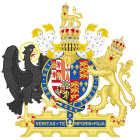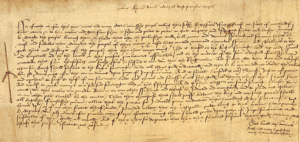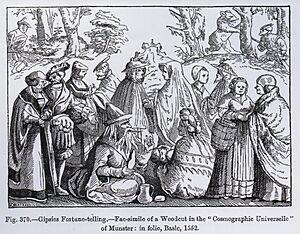Egyptians Act 1554 facts for kids
| Act of Parliament | |

|
|
| Long title | An acte for the punishement of certayne Persons calling themselves Egiptians. |
|---|---|
| Citation | 1 & 2 Ph. & M. c. 4 |
| Egyptians Act 1562 | |
|---|---|
| Act of Parliament | |

|
|
| Citation | 5 Eliz. 1. c. 20 |
The Egyptians Act 1554 was a law made in England during the 1500s. It was about Romani people and other travelers in the country. This act was passed to change older laws about Romani people. The Egyptians Act 1530 didn't cover Romani people who were born in England. It also didn't cover those who came to England from Scotland.
The new act added fines for English people who helped Romani people enter the country illegally. This was to stop some of the unofficial movement of people. Romani people caught in England could be sent out of the country. If they returned, they could face execution. However, those who stopped traveling and settled in one place were not affected by this law.
The main goal of the law was to end the "naughty, idle and ungodly life" of Romani people. It aimed to make them settle down, leave England, or face possible death.
Who Were the "Egyptians"?
In old England, leaders and regular people often looked down on a group called "Egyptians." They were also known as "Counterfeit Egyptians" or commonly "Gypsies." These people were seen as different from the usual way of life.
Historians like David Cressy say that "Egyptians" were seen as "wanderers." They didn't belong to a specific church, town, or have a regular job. This was very different from how English society was organized. English life was very structured. "Egyptians" were treated as outsiders because they didn't follow these social rules.
There is still some debate about who exactly the law meant by "Egyptian." But most people agree it referred to the Romani people. The Romani are a group of nomadic people who traveled across Europe. The term "Egyptian" was also sometimes used by the Romani people themselves. This makes it harder to know exactly who the term referred to. It likely also included other vagabonds or wanderers who lived a similar lifestyle in England.
We don't have exact proof of when "Egyptians" first arrived in England. But it's thought they came in the early 1500s. This was during the time of Henry VII of England, the first Tudor king. Records show that in 1504, a man named Sir John Arundell paid "the Egyptians when they danced afore me."
The first time "Egyptians" were mentioned in an English book was in 1529. A writer named Thomas More wrote about a fortune-teller in London. She was called "an Egyptian" and told fortunes using palmistry (reading palms).
This practice of palmistry was even mentioned in a law passed in 1531. King Henry VIII's parliament made this law to deal with these "outlandish people calling themselves Egyptians." This law was called the Egyptians Act 1530.
Understanding the Identity
From 1531 to 1598, four different laws were made about "Egyptians." Each law, from Henry VIII's in 1531 to Elizabeth I's in 1598, had different ways of identifying and punishing this group.
During this time, "Egyptians" across Europe often described themselves as "wanderers." They said they were traveling the world to make up for past sins.
The word "Egyptians" in these laws was more of a self-description. It didn't mean they were actually from the country of Egypt. It wasn't a true demonym (a name for people from a place). It was also not an endonym (a name a group uses for itself) or an exonym (a name outsiders use). For those who called themselves "Egyptian," it was just a way to present themselves.
It's important to know that the term "Egyptian" in these laws didn't refer to one specific group. Instead, it was a way lawmakers and rulers saw and defined a certain group. They used unclear definitions about being a traveler or not being born in England. This allowed them to control this group more easily. This can be seen by looking closely at the words used in the laws over those 70 years.
Laws About "Egyptians"
Here are the four main laws that dealt with "Egyptians" during this period:
- Egyptians Act 1530 An act concnyng Egypsyans. (22 Hen. 8 c. 11) This law called them 'Outlandysshe People Callynge Themselfes Egyptians.'
- Egyptians Act 1554 An acte for the punishement of certayne Persons calling themselves Egiptians (1 & 2 Ph. & M. c. 4)
- Egyptians Act 1562 An Acte for the Punishement of Vagabonds calling themselfes Egiptians. (5 Eliz. 1. c. 20)
- Vagabonds Act 1597 An Acte for punishment of Rogues Vagabondes and Sturdy Beggars. (39 Eliz. 1. c. 4)
These laws also identified "rogues," "beggars," and "vagabonds" as poor people who didn't deserve help. A new group was also added: "counterfeit Egyptian." These were people thought to be pretending to be Romani.
Some recent ideas suggest that Romani people might have become more nomadic. This could have been due to economic changes in England during the 1500s.
Earlier Laws
England had a history of passing laws against specific groups of people. This started long before "Egyptians" became a concern. These laws aimed to control people based on different reasons and problems at the time.
The first recorded law against a specific group was the Ordinance of Labourers 1349. This law was passed after the Black Death. There were not enough workers, so King Edward III passed this act. It aimed to control the labor shortage by setting rules for who could work.
After the Egyptians Act 1530 was passed, it didn't work as well as people in England hoped. So, Mary I passed the Egyptians Act 1554. She hoped this new law would have a bigger impact on the "Egyptians" still in England.
The Egyptians Act 1530 and the Egyptians Act 1554 were the last laws to use the name "Egyptians" directly. But in the years that followed, problems with vagrancy (people wandering without a home or job) continued. Because "Egyptians" were seen as wanderers, they were still a concern. For 70 years, from 1530 to 1598, four laws dealt with vagrancy and people who called themselves "Egyptians."
The Egyptians Act 1554 came soon after the Vagabonds Act 1547. This earlier act was passed during King Edward VI's first year as king. It targeted people in England who refused to work. "Egyptians" or Romani people were often known as travelers and were considered vagrants. They traveled all over England but rarely settled down. The Vagrancy Act aimed to limit the travel of all vagabonds, including Romani people. If they refused to settle, the act punished them with two years of forced labor. We don't know much about how this act affected the "Egyptians." It was removed just two years later in 1550.



